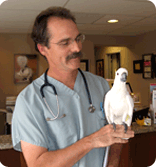Worming questions

Please can you advise me about worming?
I have an aviary of budgies with three 'tiels in the mix. I usually worm with 'solubenol'. However I recently noticed that it contains the same active ingredient as my chicken wormer (flubendazole). Is there any reason why I can't use 'Flubenvet' for my aviary birds? If so - what should the ratio be?
Also - still on the subject of worming. Should I consider worming my two pet parrots occasionally as they do spend a little time in an outside aviary on nice days. The floor is concrete slabs not earth.

Hi, Helen -
Your questions are fair, but specifically should be answered by the attending veterinarian who is familiar with your flock, their associated risks (or lack thereof) for intestinal parasitism. In part, dependent on what is known or not known in regards to your budgerigars and cockatiels (and pet parrots) in regard to their medical conditions or what preventative health maneuvers may be most appropriate, your veterinarian is best positioned to provide evidence-based recommendations that meet the needs of the birds in question. From the outside, I am unable to validate the need for treatment for intestinal parasites, what kind(s) of parasites may or may not be present, the epidemiologic risks of recurrent parasitism, or balance treatment choices optimally with the husbandry and overall health status of your flock.
There are potential health risks for yourself with empirical deworming of your chickens; drug residues can be passed through the eggs and can potentially adversely effect human health. It is for this reason that the use of those products in commercial layers is typically forbidden in most countries. Although these practices (empirical deworming) are commonly done and the availability of many of those products over the counter is also common, this does not negate some risk. My advice in that regard would also be to discuss with your attending veterinarian if there is a true need for the use of those drugs in your chickens,

































